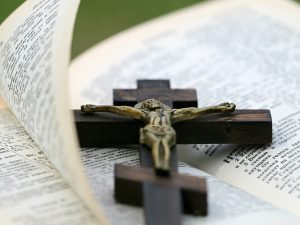It is a common charge against Christians that we ignore the unpalatable parts of the Bible, in particular the rules set down in Mosaic law as recorded in the Pentateuch.
 Firstly, the Old Testament is a pre-Christian record of the development of the Jewish people as a nation.
Firstly, the Old Testament is a pre-Christian record of the development of the Jewish people as a nation.
It’s also an account of how mankind wrestled with the effects of the Fall and failed repeatedly to honor God’s commands. This utter fail demonstrates the need for a divine Savior.
In the spiritual life, as Aquinas explains, there is operative and cooperative grace. God works in us as a doctor does to restore us to full health, but we have to cooperate with the process, as a patient takes medicine and does appropriate exercises.
In the Karate Kid (1984), Mr. Miyagi trains Daniel by having him do seemingly pointless, unrelated tasks like waxing his car, sanding the floor, refinishing a fence and painting his house. However, all the repetitive motions involved in these tasks create muscle memories that are eventually vital to Daniel’s development in the art of karate fighting.
Similarly, some of God’s commandments in the Old Testament can seem arbitrary and strange to us. However, they all had a deeper purpose. They trained the people of God to live in obedience with His will, and marked them as a holy people set apart for His divine purpose.
Even today, the rules of the Church may seem strange and pointless, but they have been laid down with profound wisdom, honoring the unity of soul and body, a unity oft riven by sin. The practice of fasting teaches us not to follow our selfish urges and appetites; it trains us to be in spiritual fighting form, ready to deny ourselves of earthly goods for the sake of heavenly treasure.
As the flesh is cut off in circumcision, so does baptism, the new circumcision in Christ (cf. Colossians 2:11), cut us off from the fallen state of mankind, enabling us to live by the Holy Spirit.
Sometimes, children may not understand their parents’ commands, but when they grow up and mature in their relationship with their parents, they come to understand that it was all said and done in love for their own good.
___
Image: PD-US
Save






1 thought on “The Old Testament and the Karate Kid”
Pingback: TVESDAY CATHOLICA EXTRA – Big Pulpit